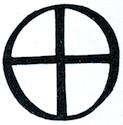SAIN SANAT SALASTA ILMI
FROM SECRET SOURCE I WRUNG THESE WORDS
Website is now online. On these pages I will keep a tri-lingual journal on my writings, travels and other current works.
Suitable to the occasion, pictured here is the hidden in plain sight, upside down, pentagram-on-forehead face visible in a Kalevala-themed statue in central Helsinki from the year 1901. It portrays Antero Vipunen, the ancient giant and keeper of secrets and spells, whom the storyteller-shaman Väinämöinen turns to for knowledge. It is from Antero Vipunen that Väinämöinen "snatches the secrets", much like Odin takes the runes ("secrets") while hanging on the world tree. Then Väinämöinen sings: "Sain Sanat Salasta Ilmi!" ("From Secret Source I Wrung these Words!")
On Monday the new issue (#6) of The Fenris Wolf book anthology arrived. It features my article The River of Story, along with a plethora of other interesting writings by the likes of Robert Taylor, Genesis Breyer P-Orridge, Freya Aswynn, Sri Gurudev Mahendranath, et al, edited by Carl Abrahamsson and with brilliant cover artwork by Fredrik Söderberg. Order your copy now from www.edda.se - Americans/Canadians order via www.jdholmes.com
On Monday it also happened to be Guru Purnima, the traditional Indian full moon festival of honouring teachers, mentors and gurus. Coincidentally, in my article in said book I deal partially with the lack of such figures in the West:
"This brings up a central problem we face in the West. We mostly lack our own gurus- that is, teachers and guides with a voice of authority and the power reflecting an ancient, unbroken tradition. Our traditions have been severed, and the access we seldom gain to them is by highly suspicious entities, whether modern or claiming ancient lineages. We are also told that our own spiritual and magical traditions are irrelevant and outdated. Instead we are offered a range of religions, ideologies and creeds from which we can pick and choose whatever might interest us on an ideal, aesthetic, but ultimately surface-level. As we lack context and handles, we stumble along in a jungle of abstract ideas written in dark chambers by pale intellectuals and lifeless scholars, surrounding ourselves with dry academia, baseless new age books, countless feel-good courses and self-help guides, mostly of thoroughly modern origin. We seek for authenticity, fiddle around with this or that esoteric discipline, dabble in dark shit, and sometimes plunge headlong into the abyss with perhaps no one there to catch us. When we resurface from the other worlds, sometimes instead of gifts to bring back with us, we carry psychic scars and holes in souls - not to mention massively inflated egos.
Let it be re-stated: what yogis and babas are is a living link in a ancient line of knowledge, of wisdom not confined to a book or creed, but spoken and sung through countless mouths since time immemorial. Yogis are the guardians of this line, which in India is called Sanātan Dharma, the eternal tradition and the laws of nature and the cosmos. What yogis do is act as conduits of magic, the blessings of nature, rooted in this ancient tradition of knowledge, for the people that seek and come to them. Ideally at least, they bring happiness, prosperity and wisdom into peoples lives. They are also the great storytellers, reflecting the story told again and again in myth and legend and long before these were written down. They tell of the quest of the hero - that is, the journey of the true human being."
Uusimmassa Ananda-joogalehdessä (2/2013) on Matti Rautaniemen kirjoittama juttu minusta Pyhiinvaellus-kirjani tiimoilta, "Uusi tapa katsoa maailmaa", sekä arvio kirjasta. Lehti löytyy Akateemisesta kirjakaupasta, useista joogakaupoista, sekä suoraan lehden sivuilta www.anandalehti.fi
Mielenkiintoinen yksityiskohta on että lehden "9 kysymystä"-palstalla vastauksestani kysymykseen siitä "mikä tekee minut iloiseksi" oli toimituksessa poistettu viimeinen lause, joka oli "Ruoka ja viini ystävien seurassa, nauraminen ja hyvä seksi." Kertooko tämä sitten lehden tilanpuutteesta vaiko juuri siitä länsimaisessa joogamaailmassa vallitsevasta sievistelystä josta kirjassani kerron, se jääköön arvailun varaan. Ironiaa löytyy, kun ottaa huomioon että lehden nimi "Ananda" tarkoittaa "iloa".



